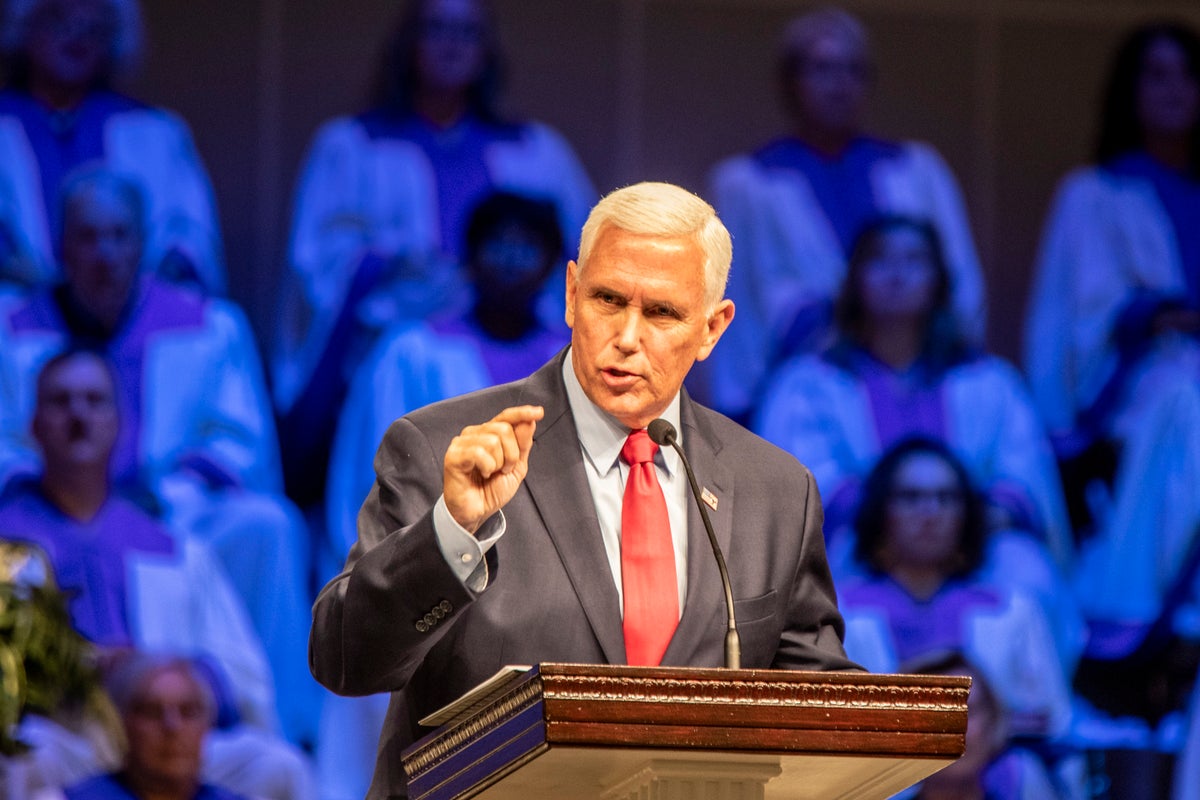
Former vice president Mike Pence revived his pitch for a nationwide ban on legal abortions during his first public remarks in the aftermath of the US Supreme Court’s decision to strike down Roe v Wade.
Without constitutional protections for the right to an abortion, “we have the opportunity to become a more perfect union,” Mr Pence said during a speech at Florence Baptist Temple in South Carolina on 20 July, nearly one month after the high court’s ruling.
“But make no mistake about it: As we gather tonight, we must recognize that we have only come to the end of the beginning,” he said. “Standing here in the first days of post-Roe America, we must resolve that we will not rest, we will not relent, until the sanctity of life is restored to the center of American law in every state in the nation.”
The speech from Mr Pence – who as governor of Indiana signed every anti-abortion measure that appeared on his desk into law – was designed to “cast a vision for a post-Roe America,” he said, offering a blueprint for Republican lawmakers to strengthen anti-abortion laws after the Supreme Court’s ruling in Dobbs v Jackson Women’s Health Organization overturned the right to abortion affirmed by 1973’s decision in Roe v Wade.
He also urged anti-abortion lawmakers to block access to medication abortion drugs and bolster the Hyde Amendment, the federal budgetary provision that prohibits the use of federal funds from abortion care.
Meanwhile, Republican lawmakers in his home state are preparing to convene for a special legislative session to debate and vote on sweeping abortion restrictions that would outlaw nearly all abortion care, with exceptions only for pregnancies from rape or incest.
In South Carolina, anti-abortion lawmakers also are considering legislation that would impose a near-total ban on all abortion care, with no exceptions for rape or incest.
Mr Pence said that the so-called pro-life movement – which has spent decades guiding state legislatures and members of Congress and the White House to advance legislation and promote anti-abortion judicial appointees – has “more work to do” beyond the end of Roe.
“If you’re going to be pro-life, you need to be pro-adoption,” he said.
He called on the crowd to “re-double your commitment to provide care and support to expectant mothers, newborns, and young families.”
His comments echo what he told Breitbart in the moments after the Supreme Court ruling on 24 June, saying that now that Roe has been “consigned to the ash heap of history, a new arena in the cause of life has emerged.”
“It is incumbent on all who cherish the sanctity of life to resolve that we will take the defense of the unborn and the support for women in crisis pregnancy centers to every state in America,” said Mr Pence, pointing to the proliferation of nonmedical facilities, typically run by Christian organisations, that discourage people from seeking abortions.
“Having been given this second chance for Life, we must not rest and must not relent until the sanctity of life is restored to the center of American law in every state in the land,” he told Breitbart.
Democratic members of Congress have repeatedly warned that Republicans are likely to introduce and pass a federal abortion ban if the GOP takes control of the House and Senate in midterm elections.
Republicans insist that the Supreme Court’s ruling merely and correctly returned the question of whether to legally allow abortions to individual states.
But within the weeks after the Supreme Court’s decision in Dobbs, House Republicans introduced the Heartbeat Protection Act, which would impose a federal abortion ban, outlawing abortions at roughly six weeks of pregnancy – before many people know they are pregnant, typically two weeks after a missed period.
Congressional Republicans also have openly discussed advancing “fetal personhood” measures, which would grant fetuses, embryos and fertilized eggs full protections under the law.
Mr Pence – widely considered a possible contender for the GOP nomination for president in 2024 – delivered his remarks in South Carolina during his third trip to the closely-watched early primary election state since leaving Donald Trump’s administration.
Next month, he also is scheduled to visit New Hampshire, another early primary state.






